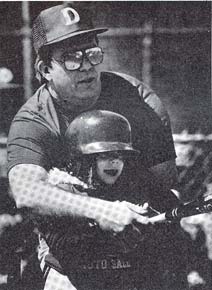
Wendy Maeda/ The Boston Globe
|
Recent broad public sentiment and local and national political involvement have moved officials of Little League Baseball, Inc. (Williamsport, PA) to develop a nationwide program for moderately and severely disabled children.
Little League Baseball, founded in 1939, is the largest youth sports program in the world, involving 2.5 million youngsters in 30 countries. However, it was not until the summer of 1987 that Little League Baseball was faced with various national pressures to serve disabled children.
Beginning with summer of 1986, Downey Memorial Little League of Brockton, MA, has conducted an unofficial special division of Little League Baseball for disabled children. After the 1987 season, the Brockton Board of Directors petitioned League officials in Williamsport to recognize their two year effort. They requested their special program be officially recognized as a division under the Brockton Little League Charter.
On October 26, Williamsport officials wrote to John Reed, President of the Brockton League. The letter stated that the national Board of Directors had voted to reaffirm their policy which prevents the sanctioning of teams of disabled youth under the national charter. Brockton officials were also informed the Board of Directors would not charter the existing 32 teams in the League for the 1988 season, if Brockton continued its program for disabled children.
National Little League Directors offered several reasons for refusing to permit teams of disabled children...
Brockton officials and parents .remained steadfast. They met to develop a strategy to gain formal acceptance of their program.
As a consequence of this meeting, Reed was asked to contact local and national figures to ask for help.
U.S. Senator John F. Kerry, Democrat, with a Boston law firm offered assistance. In addition, thousands of letters and telephone calls were received from around the country. Senator Kerry indicated that, if necessary, he would ask Congress to amend the Little League Baseball Congressional Charter of Federal Incorporation to require inclusion of disabled youth.
The National Board of Directors ultimately reversed their position. Senator Kerry received the following assurances from Dr. Creighton Hale, President and CEO:
The task force assembled to assist Little League's effort in developing a national program for the disabled is comprised of eight national leaders. Both Senator Kerry (MA) and Senator Dole (KS) have been asked to serve, with Senator Dole serving as chairperson. Work of the task force should be completed by January 1989, and materials are expected to be distributed to local communities by March.
Little League Baseball should be commended for its progress, but monitoring its commitment to the disabled is imperative. It should be noted that of the eight national leaders asked to serve on the Little League task force, no one from the fields of adapted physical education or therapeutic recreation was asked to serve. Although the program involving the disabled appears to be heading in the right direction, developments should be monitored by these two professions in the months to come.
As hundreds of communities around the country begin to offer baseball programs to the disabled next spring, adapted physical education and therapeutic recreation professionals at the local level should be asked to lend assistance. Our knowledge of growth and development, disabilities, pedagogy, and our ability to adapt sport rules and skills could assist local Little League officials and parents in efforts to create safe and viable programs. As programs emerge, needs develop, and opportunities arise, can we afford not to be involved in this issue?